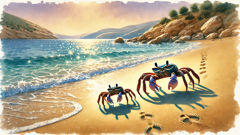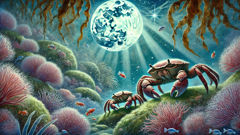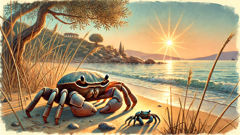Introduction
On the shimmering edge of the ancient Aegean, where the sky spills gold onto the restless waters and the olive trees bow in the salt-laden breeze, a world of quiet lessons unfolds each dawn. The sun stretches over a coastline scattered with limestone cliffs and narrow coves, illuminating a stretch of sand alive with whispers—the click of tiny shells, the susurrus of waves, and the quiet scuttle of countless creatures. It is here, in a cove known only to the seabirds and the gods, that a mother crab and her only son begin their day. While the world above bustles with fishermen, merchants, and philosophers debating in shaded courtyards, life beneath the tide is woven with its own stories, no less profound. The mother crab, wise in years and marked by the gentle erosion of the sea, carries the weight of tradition and the hope for her son's future. Her shell is etched with lines—memories of seasons past, storms weathered, and the many crossings she has made across these sands. Her son, bright-eyed and curious, sees every ripple in the sand as a path to adventure. The morning finds them beneath a rock partially shaded by trailing sea-grasses. The air is thick with promise, the sky painted with hues that shift from peach to indigo. The mother has decided that today is the day to teach her son the ways of crabs—how to find the freshest morsels, how to avoid the darting shadows of gulls, and above all, how to walk with pride and purpose across the shifting sands. Yet, as ancient as her wisdom may be, the lessons she imparts will be tested by the innocence and honesty of youth. The tale that emerges is not simply a fable about crabs; it is a reflection of every parent and child, every leader and follower, who has ever tried to shape another without first examining their own path. In the gentle interplay between mother and son, the golden sands of Greece become the stage for a timeless lesson: that true guidance begins not with words, but with example.
The Walk Across the Sands
The day had barely broken open, and yet the cove was already humming with the subtle activity of its smallest inhabitants. The scent of saltwater mingled with wild thyme drifted on the breeze, and the sand—damp and cool—bore the imprints of birds, cloven-hoofed goats, and, most recently, a pair of crabs making their way toward the water’s edge. The mother crab led the way, her movements deliberate, her legs splaying to the sides as she inched forward with the practiced rhythm of countless migrations. Behind her, her son scampered, sometimes stopping to investigate a stray feather or marvel at the glinting edge of a seashell half-buried in the sand. He was smaller than the rest, his shell still soft in places, his eyes unclouded by the worries of the world.

They had only gone a short distance when the mother crab paused, turning to fix her gaze on her son. "Come now, little one," she chided gently, "you must learn to walk straight. See how you wander this way and that? The world is full of dangers for those who do not mind their path."
Her son stopped in his tracks, startled. He watched as his mother gestured with one claw, trying to demonstrate a more proper, forward motion. Yet, as she tried, her own legs carried her sideways across the sand—a movement so instinctive she hardly noticed. The young crab tilted his head, watching closely.
"But, mother," he replied, voice as soft as the foam that crowned the morning tide, "isn’t this the way you walk too? I’ve never seen you move any other way."
The mother crab faltered, the lesson momentarily lost in her son’s simple, honest question. For a heartbeat, the world seemed to hold its breath—the sound of the waves faded, and even the seabirds circling above slowed in their dance. A shadow passed across her shell as a gull soared overhead, and the mother crab found herself gazing at her own legs, now frozen mid-stride.
A hush fell over the cove as she considered her response. The sun continued its climb, warming the sand beneath their feet, and for the first time in many seasons, the mother crab saw herself not through her own eyes, but through her son’s. She realized she had never questioned her own way of moving—never considered that what came so naturally to her might also be inherited by the one she sought to guide.
A soft smile crept across her face. "You are right, my child," she said at last, her voice as gentle as the tide. "I have always walked this way. Perhaps it is not for me to tell you to walk differently until I myself can do so."
Her son’s eyes brightened, and he scuttled forward, emboldened by his mother’s honesty. They moved together, their legs tracing parallel lines in the sand, their shells catching the golden light. The beach seemed to embrace them, and even the distant rocks, worn smooth by centuries of wind and water, bore silent witness to their newfound understanding.
The rest of the day unfolded with an easy camaraderie. The mother crab showed her son how to dig for food beneath the wet sand, how to recognize the warning flicker of a predatory fish’s shadow, and where to hide among the kelp when the sun was highest. They shared stories—of storms survived and friends lost, of hidden treasures washed ashore after distant tempests. The world was vast and mysterious, but together they felt a little braver.
As dusk approached and the tide began to pull back, mother and son rested side by side atop a smooth stone warmed by the day’s sun. They watched as the sky bled from gold to violet, listening to the lullaby of the waves. The mother crab stroked her son’s shell with a gentle claw.
"Today you have taught me as much as I tried to teach you," she said quietly. "Sometimes, the wisest lessons come from those we seek to guide."
Her son nestled closer, comforted by her warmth. The world grew still and luminous as the first stars appeared above the horizon. In that moment, beneath the ancient sky and before the eternal sea, a lesson older than time itself settled between them: that true leadership is not a matter of command, but of example; that wisdom is found as much in listening as in speaking; and that the patterns we pass on are often those we live ourselves.
The wind whispered through the grasses, and the waves smoothed away their footprints in the sand. Mother and son remained together, content in their shared understanding, their hearts as open as the vast Aegean beyond.
Lessons Beneath the Tide
Night fell gently over the Aegean cove, painting the world in shades of indigo and silver. The breeze cooled, carrying with it the scent of jasmine from gardens hidden beyond the dunes. As the stars multiplied above, mother and son made their way beneath the surface—a realm both familiar and mysterious. Here, the water muffled sound and transformed light, so that everything shimmered with a quiet magic.

The seafloor was alive with colors—the emerald sweep of kelp forests, the coral pinks of small anemones waving their tendrils, and the dappled glow where moonlight filtered down through shifting waves. Fish darted among rocks, their scales flashing like coins tossed by forgetful gods. Sea urchins nestled in crevices, their spines gleaming, while tiny shrimp danced in the eddies near shore. Every creature had its place, every movement a lesson written in patience and adaptation.
The mother crab moved slowly, her every step careful, aware now that her son watched her with new understanding. She showed him where the best clams buried themselves in soft mud, how to avoid brittle stars that could entangle unwary legs, and how to read the current’s pull as it swept across the reef. Each task was not just a matter of survival but a way to share a deeper wisdom—that each creature’s way of moving, living, and being had been shaped by generations before.
The young crab listened, his senses open to every nuance. He imitated his mother’s careful gestures, but also experimented—sometimes attempting to dart forward or move in circles, only to laugh when his legs betrayed him and sent him sideways once again. The mother crab did not scold him this time. Instead, she encouraged his curiosity, letting him learn through trial and error.
They explored together, discovering a hidden hollow beneath a tangle of seaweed where small crabs gathered each night. Here, stories were exchanged: tales of shipwrecks and moonlit tides, of fishermen’s nets and miraculous escapes. The elder crabs spoke of ancestors who had witnessed the rise and fall of distant civilizations, who had listened to the songs of Homer’s sailors and watched the birth of cities along these shores.
One particularly ancient crab, his shell mottled with age and wisdom, told them, "We walk as we do because the world made us so. There is no shame in the path given to us by nature. But we must always be mindful of what we teach by our actions. The young see all, even when we do not notice."
The mother crab pondered these words as they returned home beneath the stars. She realized that her own example—the care she showed in choosing shelter, the way she greeted neighbors, even her patience in facing daily dangers—was as powerful a lesson as any spoken advice. Her son absorbed it all, for his eyes were always watching.
Back on land, as dawn began to chase away the darkness, mother and son climbed once more onto their favorite rock. The mother crab turned to her child, her voice thoughtful and kind. "Do not be afraid of your path, even if it is not straight. What matters is that you walk it with honesty and kindness."
Her son nodded, feeling the truth settle within him like a pearl inside a shell. Together, they watched the first rays of sun paint the waves gold once more, ready to face another day—side by side, their journey shaped by example and love.
Conclusion
In the gentle embrace of another Aegean dawn, the cove’s sands bore fresh lines—two parallel tracks tracing a mother’s journey and a child’s eager steps. The world above began to stir: fishermen hauled their nets, children’s laughter echoed from distant hills, and the olive groves awoke to a chorus of cicadas. Yet below, where waves met shore in an endless dance, a quiet transformation had taken root. The mother crab no longer measured her worth in the lessons she could dictate, but in the example she lived with every sideways stride. Her son, guided by patience rather than reproach, grew more confident—curious not just about how to walk, but how to be. Their story lingered long after their footprints vanished—carried in the salty air, whispered by the tide to every creature willing to listen. The fable of the two crabs became a gentle reminder to all who journeyed here: to lead is to embody what you wish to teach; to guide is first to understand yourself. In the quiet symphony of nature, where each movement is both inheritance and choice, wisdom flows from the lives we live before the eyes of those we love.













